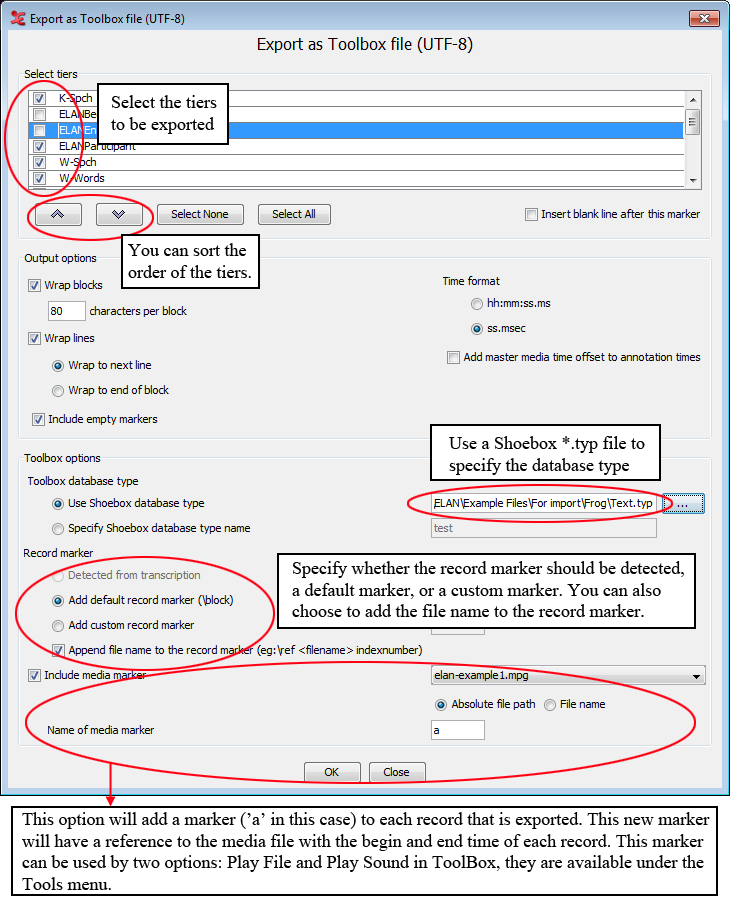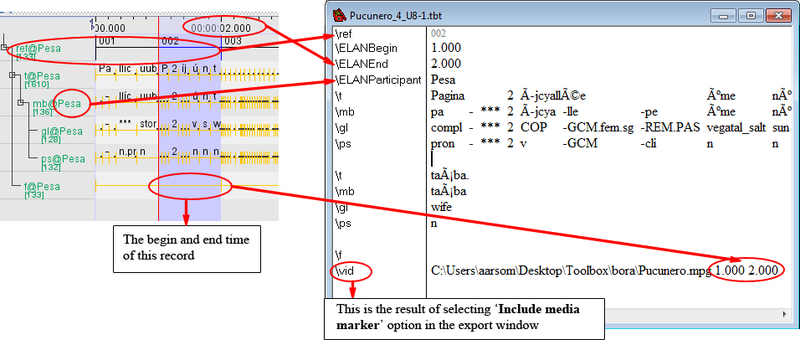Toolbox file(UTF-8)
Similar to exporting a document to Shoebox (see the section called “Shoebox file”) ELAN data can be exported to a Toolbox document with an UTF-8 encoding. This export provides more options for output customization.
To export a file into Toolbox, do the following:
Click on menu.
Click on
The dialog box appears:
Figure 35. Toolbox Export dialog window

Only the left part of ELAN tier names containing an @ are identified as tier markers for Toolbox. These markers form a block in the exported file. The right part of the ELAN tier names are identified as participant names. These are exported with the marker ELANParticipant see the figure below:Figure 36. ELAN file and exported Toolbox file

If you use a Shoebox *.typ file to specify the Toolbox database type ELAN extracts the database type name from the first line of the type file (e.g. the database type name Text in
\+DatabaseType Text) and puts is in the first line of the exported file (e.g.\_sh v3.0 400 Text).When there is only one root tier (tier without a parent tier) in the transcription (e.g. ref) this will be used as the record marker by default. When there are multiple root tiers "\block" will be added as record marker. In both cases it is possible to specify a custom record marker instead.
Some options not touched up in Figure 35, “Toolbox Export dialog window”:
By first selecting a tier(the section called “How to select tiers”) and then selecting you insert a blank line after the selected marker every time the marker is printed in the exported file. The tier name is colored blue in the dialog box.
By selecting you can let ELAN wrap a whole block if one of the lines in a block is longer than a specified number of characters (default is 80 characters). A block in this context refers to the markers that are part of the interlinearization.
When is selected it is also possible to select . This applies to long marker lines that are not part of the interlinearization. There are 2 variants: when Wrap to next line is selected the line is split into 2 or more lines that immediately follow each other, regardless of their position in the record. When Wrap to end of block is selected everything beyond the first wrap is placed at the end of the record. Note that wrapped interlinearization blocks are grouped as much as possible.
When is selected all markers will be printed in each record, whether there is content or not. When this option is not selected a marker will not be printed in a record when it has no content.
By selecting you can add to the annotation times the time offset from the master media that originated from the synchronization of media files (see the section called “Synchronizing video files”).
Make a choice and click on to continue.
Specify the name and directory of the exported file.
Click to export the file; otherwise click to exit the dialog box without exporting the file.
The file is exported as a
*.txt|*.sht|*.tbtfile.If there already exists a file of the same name, ELAN will ask you whether or not it should overwrite the existing file.
Open the exported file in Toolbox.
It contains the following information:
All tiers and annotations.
Each ELAN parent annotation (including all its referring annotations) corresponds to one Toolbox record. E.g., in the illustration below, the ELAN parent annotation “CLLDCh3R02S01.001” corresponds to the Toolbox record “CLLDCh3R02S01.001”.
The time code information for each parent annotation.
Each ELAN parent annotation (i.e., each Toolbox record) contains the additional field markers
\ELANBeginand\ELANEnd(i.e., the begin and end time of the parent annotation).This time code information allows you to import the Toolbox file back into ELAN, without having to manually re-align the file (see the section called “Shoebox file”).